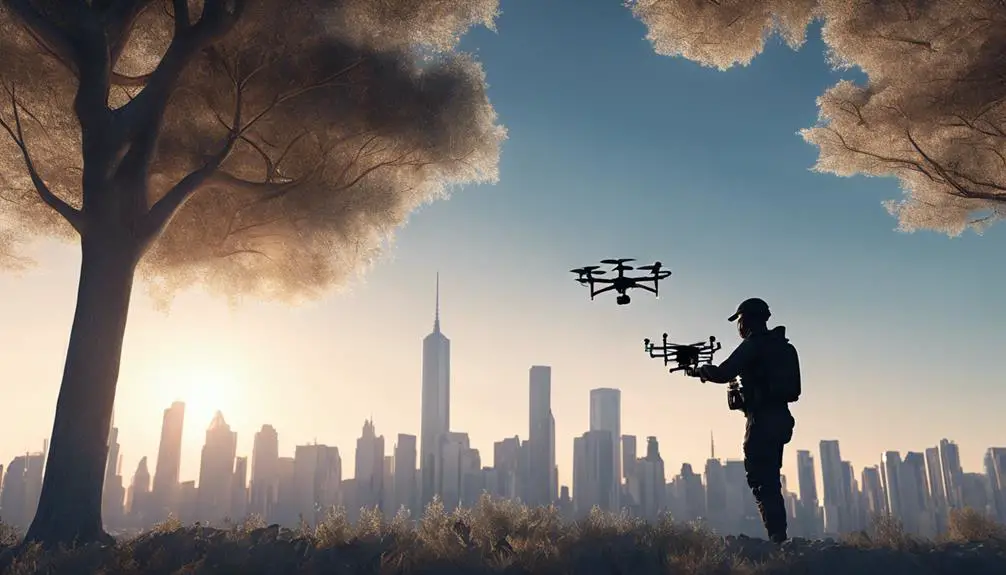You generally can’t shoot down a drone without facing serious legal consequences. Laws vary by location, and many places consider drones as property, meaning shooting one down could lead to fines, criminal charges, or even federal penalties. Not to mention, there’s a risk of causing injury to bystanders or damaging property from falling debris. Instead of resorting to extreme measures, consider peaceful alternatives like reporting the drone activity to authorities or using safe capturing methods. If you’re curious about your rights and safer options, there’s more information available that can help you navigate this complex issue.
Understanding Drone Regulations
Understanding drone regulations is essential if you’re considering taking any action against a drone, as laws vary widely by location and situation. You might feel your freedoms are threatened, but you need to know that many jurisdictions have strict rules governing drone usage and your rights regarding them. For instance, some areas classify drones as aircraft, which means that shooting one down could lead to severe legal consequences. It’s vital to research local laws and consult legal experts if you’re uncertain. Remember, exercising your rights responsibly is key to maintaining your freedom. Ignorance of the law won’t protect you, so arm yourself with knowledge before making any decisions that could impact your liberty. Stay informed and proactive!
Legal Implications of Shooting
Shooting down a drone can lead to serious legal repercussions, including fines and even criminal charges, depending on your location and the circumstances. Many jurisdictions classify drones as property, meaning that firing at one could be viewed as destruction of someone else’s property. In some cases, you might be charged with reckless endangerment if your actions threaten public safety. The federal government also has regulations in place, and shooting down a drone could attract federal attention, resulting in hefty penalties. While you might feel justified in defending your space, it’s vital to reflect on the potential legal fallout. Always explore peaceful solutions before resorting to extreme measures. Your freedom’s worth it, so think twice before pulling that trigger.
Privacy Rights and Drones
As concerns about privacy grow, the rise of drones has sparked debates over how these flying devices may infringe on personal privacy rights. You might wonder how drones can capture images or record audio without your consent, leading to a potential violation of your freedoms.
Here’s a breakdown of privacy concerns related to drones:
| Concern | Impact on Privacy | Possible Solutions |
|---|---|---|
| Surveillance | Continuous monitoring | Stronger regulations |
| Data Collection | Harvesting personal info | Anonymity requirements |
| Unauthorized Access | Invasive intrusion | Clear ownership policies |
| Misuse of Footage | Exploitation of imagery | Penalties for misuse |
Ultimately, as drone technology advances, it’s essential to protect your rights and advocate for regulations that prioritize personal freedom.
Safety Concerns and Risks
Maneuvering the skies with drones raises significant safety concerns and risks that can impact both operators and the public. When you consider shooting down a drone, think about the potential consequences. A stray bullet could harm innocent bystanders, damage property, or even injure the drone’s operator. Additionally, the unpredictability of falling debris poses a serious threat to safety. Drones can also be equipped with cameras or other devices, raising concerns about how shooting one down could escalate a situation. It’s essential to weigh the desire for freedom against the risks of injury or legal repercussions. Instead of resorting to drastic measures, consider safer alternatives that respect your rights while ensuring everyone’s safety in the skies.
Alternatives to Shooting Drones
Finding effective alternatives to shooting down drones can help maintain safety and protect your rights without escalating tensions. Instead of resorting to extreme measures, consider these options:
- Signal Jammers: These devices can disrupt a drone’s communication with its operator, forcing it to land safely.
- Net Guns: Using nets can capture a drone without causing damage, allowing you to retrieve it and handle the situation legally.
Ethical Considerations in Action
Using alternatives like signal jammers or net guns raises important ethical questions about privacy, safety, and the appropriate response to perceived threats from drones. You might feel justified in defending your space, but what happens when those defenses infringe on others’ rights? These tools can disrupt legitimate drone use, impacting both personal and commercial activities. Furthermore, the potential for misuse looms large; the line between protecting yourself and encroaching on someone else’s freedom can blur easily. You’ve got to reflect on the broader implications: could your actions lead to a culture of fear and distrust? Balancing your desire for autonomy with the respect for others’ freedoms is essential in maneuvering this complex landscape of drone technology and personal rights.

